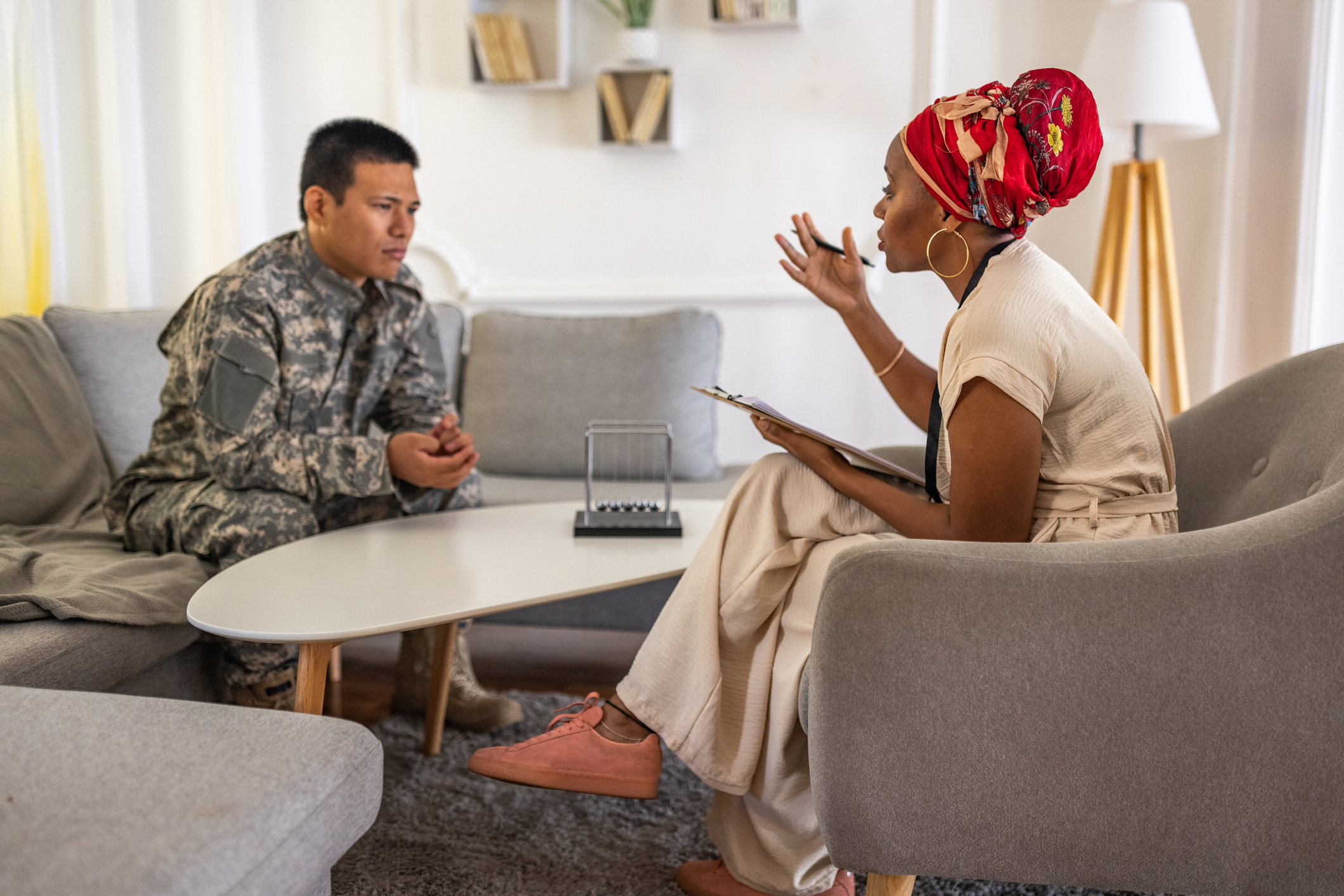Master’s in Clinical Psychology Program Guide
If you want to help people navigate and overcome life’s challenges, you may benefit from earning a master’s degree in clinical psychology, especially if you want to pursue a doctorate in psychology.
You’ll need a Ph.D. or Psy.D. to become a clinical or counseling psychologist, per the American Psychological Association (APA). However, there are plenty of in-demand counseling and research roles with competitive salaries that you can pursue with a master’s in clinical psychology degree.
Depending on your specialization, you can work with K-12 or college students, people with chronic illnesses, or people with mental health conditions. Our guide will teach you all you need to know about master’s in clinical psychology programs.
What Is a Master’s in Clinical Psychology Degree?
A master’s degree is required to work as a professional counselor. Most master’s in clinical psychology programs prepare you to meet state licensure requirements through research and clinical training. You’ll typically take between 36 and 68 credits over roughly two years, though you may take longer if you’re only taking courses part time.
You’ll learn how to deliver mental health services rooted in science. You’ll also learn to design and analyze clinical research. Your classes may include psychological assessment, trauma in diverse populations, multicultural counseling, psychopathology, and research methods.
These programs usually end with a practicum or internship and a clinical competency exam. Some programs require a thesis, while others let you choose between specialty tracks such as marriage and family therapy or professional clinical counseling.
Once you graduate, you can work in various clinical or research settings or apply to doctoral programs.
If you want to work as a clinical or counseling psychologist or teach at the college level, then you’ll need to earn a doctorate as well. However, if you’re more interested in becoming an industrial-organizational psychologist, then a master’s degree will likely suffice.
What Can You Do With a Master’s in Clinical Psychology Degree?
A master’s in clinical counseling degree can help qualify you for a variety of careers in counseling and psychology.
Master’s in Clinical Psychology Jobs
With a master’s in clinical psychology degree, you can work in counseling centers, hospitals, schools, and group and private healthcare offices.
According to the Bureau of Labor Statistics (BLS), relevant careers include marriage and family therapists, school and career counselors, and substance use, behavioral disorder, and mental health counselors. You can also work as a survey researcher.
The BLS projects employment for most of these roles to grow faster than the projected average rate of 4% job growth for all occupations from 2023 to 2033, with employment for substance use, behavioral disorder, and mental health counselors projected to grow by 19% during this time period.
On the lower end, the BLS projects employment for survey researchers to experience no growth from 2023 to 2033.
How Much Money Can You Make With a Master’s in Clinical Psychology Degree?
Master’s in clinical psychology program graduates can earn median annual salaries between roughly $53,000 and $62,000, as per 2023 BLS data.
According to the BLS, substance use, behavioral disorder, and mental health counselors earned a median annual salary of $53,710 in 2023, putting them on the lower end of the earning potential spectrum. On the higher end, educational, guidance, and career counselors and advisors earned a median annual salary of $61,710 during this same time period.
| Job Title | Median Annual Salary (May 2023) | Job Growth Rate (2023-33) |
|---|---|---|
| Marriage and Family Therapists | $58,510 | 16% |
| Educational, Guidance, and Career Counselors and Advisors | $61,710 | 4% |
| Substance Use, Behavioral Disorder, and Mental Health Counselors | $53,710 | 19% |
| Survey Researchers | $60,960 | 0% |
Continuing Education in Clinical Psychology
After you earn a master’s in clinical psychology degree, you can pursue a doctorate, which is required to work as a clinical or counseling psychologist. Students most commonly earn a Ph.D. or Psy.D. in clinical psychology. These programs typically take between four and seven years to complete.
Remember that a Ph.D. is an academic, research-focused degree, while a Psy.D. focuses more on clinical practice. Ensure your doctoral program is accredited by the APA and that the program prepares you for licensure by providing a supervised internship.
You also have the option to pursue professional certifications like Certified Clinical Mental Health Counselor (CCMHC) after your master’s program. Additionally, some universities, like Marshall University, offer graduate certificates.
How Much Does a Master’s in Psychology Program Cost?
Master’s in Psychology, 2019-20
Avg. Tuition & Fees
$13,264
Avg. Net Price
$11,901
Source: NCES PowerStats
The average master’s in psychology program, including clinical psychology, costs $13,264 in tuition and fees, according to 2019-20 data from the National Center for Education Statistics (NCES). After financial aid is factored in, the average net price drops to $11,901.
For example, Pepperdine University charges $1,945 per credit for its master’s in clinical psychology program. By contrast, Northwestern University charges $22,304 per quarter for full-time master’s in clinical psychology program students, with part-time students paying $7,935 per unit.
Get Financial Aid for Your Master’s in Psychology
How to Get a Master’s in Clinical Psychology Degree
Learn how long master’s in clinical psychology programs take to complete and find out what the common application requirements are.
How Long Does It Take to Get a Master’s in Clinical Psychology Degree?
Typical # of Credits
30-60 Credits
Typical Program Length
2-3 Years
You can expect to spend around two years in your master’s in clinical psychology program. Credit requirements range from around 30 to 60, so carefully read university websites before applying to any programs.
For example, Cleveland State University requires students to complete 50 credits, the University of Michigan-Dearborn requires 48 credits, and Ball State University requires 36 credits.
How to Apply for a Master’s in Clinical Psychology Program
Before you can apply to master’s in clinical psychology programs, you’ll need to earn a bachelor’s degree in psychology or counseling. Some programs want prerequisites in introductory and abnormal psychology, statistics, research methods, and experimental design.
Here are some of the common requirements for master’s in clinical psychology programs:
Bachelor’s degree
Application and fee
Admissions essay
Letters of recommendation
Official transcripts with a minimum GPA of 3.0
GRE scores (if applicable)
How to Choose a Master’s in Clinical Psychology Program
The biggest factors in choosing a master’s in clinical psychology program include program cost, accreditation status, course content, and format.
How Much Will It Cost?
While you can apply for grants and scholarships to reduce the cost of tuition and fees, master’s degree programs are expensive. Like many students, you’ll likely take out loans to pay for some or all of your degree.
To find the potential return on investment of your master’s in clinical psychology degree, compare the cost of tuition with the amount of money you expect to earn once you graduate.
Is It Accredited?
Make sure you only apply to accredited master’s in clinical psychology programs. Programmatic accreditation ensures your program meets specific academic standards and can lead to licensure. It also signals to prospective employers that you learned the required knowledge and skills to perform a given role successfully.
Look for programmatic accreditation from the Master’s in Psychology and Counseling Accreditation Council (MPCAC) or the Council for Accreditation of Counseling and Related Educational Programs (CACREP).
What Courses and Concentrations Does It Offer?
In a master’s in clinical psychology program, you’ll learn how to assess, diagnose, and treat mental health conditions via scientific-based services.
Some common concentrations you can choose from include general psychology, addictions, forensic psychology, and industrial-organizational psychology.
Additionally, here are some common courses you may take in your master’s in clinical psychology program:
- Foundations in psychological assessment
- Psychotherapy
- Trauma in diverse populations
- Multicultural counseling
- Science of psychopathology
- Statistics
- Research methods
What Is the Format of the Program?
Make sure you choose a program format that matches your learning style. Depending on the program, you may have the option to learn on campus, online, or in a hybrid format. An on-campus program will let you learn directly from your professors and interact with your classmates, which can enhance learning.
However, an online program offers the most flexibility, allowing you to learn anywhere with an internet connection. In a hybrid learning environment, you get a blend of on-campus and online learning.
Discover the Best Clinical Psychology Programs
Explore More College Resources

Psychologist vs. Psychiatrist: What’s the Difference?
Psychology and psychiatry both study the human mind, but have different treatment therapies. Discover the differences between these professions.

by Blake Weil
Updated March 29, 2023







